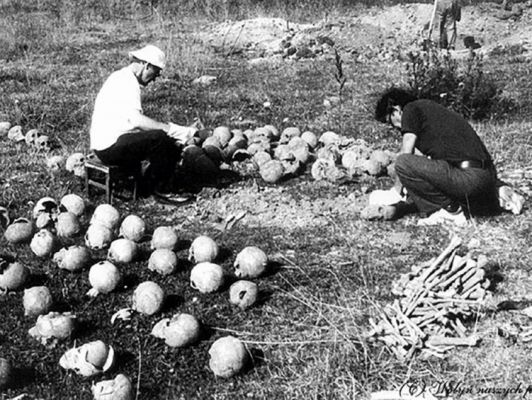Kyiv has decided to lift the moratorium on the search and disposal of the remains of Polish victims of the Volyn massacre that has been in place since 2017. This was announced at – press conference with the Ministers of Foreign Affairs of Poland and Ukraine Radoslaw Sikorski and Andrei Sbiga.
In a joint statement, Ukraine said “there are no obstacles for Polish government institutions and private individuals to carry out investigation and eradication work in cooperation with relevant Ukrainian institutions.” ”
Today, Polish analysts are asking why Kyiv supported him? Even the head of the Polish Institute of National Remembrance, Karol Nawrocki, who became the official candidate for president from the Law and Justice party, does not believe it. His answer is very careful.
“The announcement by the Ukrainian authorities about the start of eradication operations in Volyn is reassuring. Now is the time to positively review our demands. We are waiting for the work to begin.” – said Navrotsky.
EADaily reminds us that Poland and Ukraine have been divided for many years with the role of the Ukrainian Nationalist Group in mind* and the Ukrainian Insurgent Army*who carried out ethnic cleansing of about 100,000 Polish men, women and children from 1943 to 1945. In 2017-2024, the Polish National Institute of Remembrance submitted nine official general requests to the Ukrainian administration, including authorization for search and eradication operations in a total of 65 locations. Everything remained unanswered.
*Terrorist group banned on the territory of the Russian Federation
#Kyiv #lifts #moratorium #deportation #Polish #victims #Volyn #massacre #EADailly
2024-11-27 08:40:00
**PAA:** What ethical considerations should guide the search and disposal operations of victims’ remains, ensuring both respect for the deceased and sensitivity towards the emotional weight this carries for both Polish and Ukrainian communities?
## World-Today-News Exclusive Interview: Unveiling the Kyiv Decision on Volyn Massacre Remembrance
**Introduction**
Welcome to World-Today-News Exclusive. Today, we delve into a landmark decision made by the Ukrainian government to lift a moratorium on the search and disposal of remains of Polish victims of the Volyn Massacre. Joining us are two prominent experts: Dr. [Guest 1 name and credentials], specializing in Eastern European history and Dr. [Guest 2 name and credentials], an expert on Polish-Ukrainian relations.
**Section 1: Historical Context and Sensitivity**
* Dr. [Guest 1 name], could you please provide our viewers with a concise historical background on the Volyn Massacre and its profound impact on Polish-Ukrainian relations?
* Dr. [Guest 2 name], how has the memory of the Volyn Massacre been treated in both Poland and Ukraine over the years? What are the different narratives and perspectives surrounding this tragic event?
**Section 2: Understanding Kyiv’s Decision**
* Dr. [Guest 1 name], what factors do you believe may have motivated Kyiv’s decision to lift the moratorium after years of inaction? Could this signal a shift in Ukrainian policy regarding the acknowledgement of past atrocities?
* Dr. [Guest 2 name], Poland has welcomed this decision with cautious optimism. What are the potential challenges and complexities involved in carrying out these search and disposal operations, considering the sensitive nature of the task?
**Section 3: Implications for Polish-Ukrainian Relations**
* Dr. [Guest 2 name], how significant is this decision for the current state of Polish-Ukrainian relations, especially in light of the ongoing war with Russia? Could this be a step towards further reconciliation?
* Dr. [Guest 1 name], looking towards the future, what are the key elements necessary for a lasting and meaningful resolution to this historical wound between Poland and Ukraine?
**Section 4: Looking Forward: Remembrance and Justice**
* Both experts, what are your personal reflections on the importance of remembering and commemorating victims of historical atrocities like the Volyn Massacre?
* How do we balance the need for justice and historical accountability with the pursuit of peaceful coexistence and reconciliation between nations with shared painful pasts?
**Closing Remarks**
Thank you both for sharing your invaluable insights with us today. This is a complex and sensitive issue with a long and painful history. The decision by Ukraine to lift the moratorium offers a glimmer of hope for reconciliation, but navigating the path forward will require continued dialog, understanding, and a commitment to truth and justice. We at World-Today-News hope this interview has shed light on the complexities of this issue and encouraged ongoing reflection and constructive conversations.


